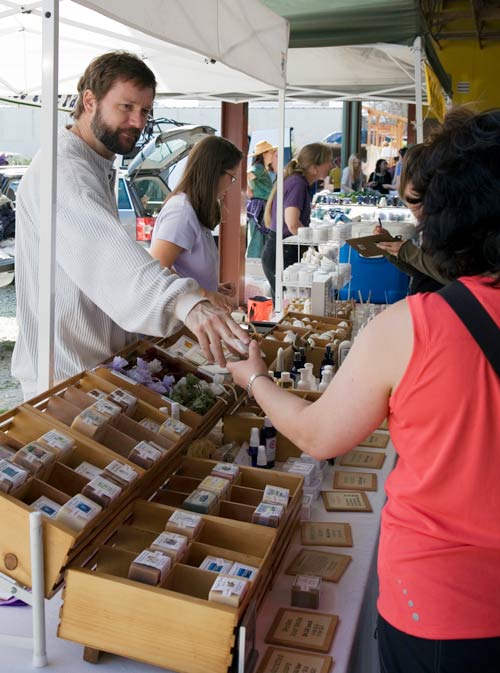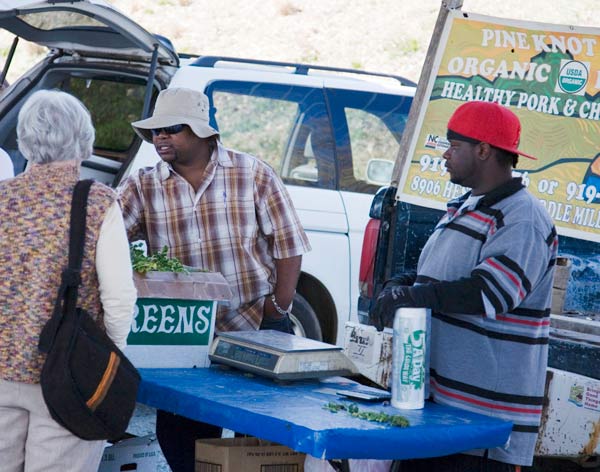By Cara Oxendine
NCCU Staff Writer
the Durham VOICE
thedurhamvoice@gmail.com
The Durham Farmers’ Market (DFM) offers the community access to fresh, locally grown fruits and vegetables, as well as natural, hormone-free pastured meats, eggs, cut flowers and so much more. It aims to promote sustainable, healthy lifestyles and is infusing a sense of community into this dis-invested area.
While there are two grocery stores in NE Central Durham (NECD), Los Primos Supermarket and Lowe’s Foods, most residents don’t have cars so many shop at mini-marts and corner stores out of convenience, which has long-term health consequences. The DFM offers Durham residents a source of fresh, locally-grown produce and products.
The US Department of Agriculture (USDA) web site explains farmers markets benefit everyone, especially in many urban communities where fresh, nutritious foods are scarce. “Farmers’ markets help to promote nutrition education, wholesome eating habits, better food preparation, as well as boosts the community’s economy.” The DFM offers live music and weekly cooking demos to encourage community participation.
“When you buy locally fresh-picked produce you’re not losing the vitamins and nutrients that occur in shipping,” said Dianne Brinkley, owner of Brinkley Farm. According to the DFM web site, “Most food travels 1,500 miles before reaching the grocery story, a two-week trip,” which causes items to lose nutrients, flavor and freshness as well.

Paul Vail, one of the Durham Farmers' Market founders, handing out a free sample of MoonDance Soaps. Photo by Mike DeWeese-Frank.
Fruits, vegetables, dairy and whole grains are generally more expensive, but the health consequences of eating unhealthily cost more in the long-run. This is important because North Carolina has the sixth highest obesity rate in the United States, according to the Centers for Disease Control and Prevention (CDC). These statistics are even higher for African American and Hispanic communities, which are the two dominant races in NECD.
According to the CDC, food-poor communities also have a higher risk for diet-related diseases like heart disease, type 2 diabetes, cancer (breast, colon and prostate), high blood pressure, high cholesterol and stroke — which are all among leading causes of death.
According to an article in Time, (‘Can American’s Urban Food Desert Bloom?’) disadvantaged urban communities like NECD, are often referred to as ‘food deserts’ because they lack, or have limited access to healthy food options usually due to transportation and financial restrictions. But farmers’ markets, food banks, community gardens, and school lunch programs are a few local ways communities can help end this urban health crisis.
The DFM began in 1998 in an old parking lot at the old Durham Bulls stadium. It recently relocated in 2006, to the Pavilion at Durham Central Park. “We have almost doubled production and sales [since 2006],” said Paul Vail, co-owner of MoonDance soaps, regarding the new venue. He and his wife have been part of the DFM since the start.
“The new venue created an atmosphere where the community could gather, socialize and shop,” said Vail. But they want to increase foot-traffic, so he suggested putting fliers in mailboxes, on cars, in restaurants, and in businesses. He also hinted that transportation could be an issue with getting NECD residents to the market, since he’s never seen a bus on Foster Street.
The NC (Durham) Department of Transportation (NCDOT) said the nearest stops were a few blocks away, one at the Durham Performing Arts Center (DPAC) and the other on Rigsby Avenue and Seminar Street – both at least a half-mile walk. Vail explained no one wants to tote bags this far and then ride a packed bus home with all their produce. Bus rides can be long, and often riders have to take more than one to get where they are going.
On Saturday mornings, Foster Street has steady pedestrian traffic going to and from Durham Central Park – people walking through the Pavilion, mingling stand-by-stand with vendors, picking out vegetables, cheeses, and socializing with other shoppers and locals. Vendors have their own banners or signs displaying their farm and/or business name and a price-list. Some even display pictures of their farm, or the processes they go through to craft their product.
“People like having fresh food, supporting the farmers and making sure the land stays as farmland,” said Dale Fluke, owner of Little Tree Farm, in the Duke Chronicle (2008). “We are going towards sustainable, organic farming by crop and animal rotation and minimizing or not using pesticides and herbicides. It’s another benefit our customers recognize.”
At the DFM people know where their food is coming from and who produced it; it also helps support small farmers by cutting out the middle-man, so more of the money goes directly in their pocket. The DFM membership organization is 75 percent farmers and 25 percent crafters, and vendors vary with the seasons depending on the products they bring to market.
The DFM is a producer-only market – so no resellers allowed. Vendors are not allowed to buy items to bring and sell at market. There are more than 50 vendors, all within 70 miles of the market, who bring an assortment of local products: fruit, vegetables, meats, eggs, cut flowers, potted plants, artisan cheese/breads, home baked pies, honey, hand-made chocolates, preserves, local wines, hand made soaps, pottery, jewelry, artwork and more.
“Our customers are like family and we enjoy seeing them every week,” said Dianne Brinkley, owner of Brinkley Farm, and the only part she doesn’t enjoy is waking up at 3 a.m. every Saturday. Her farm is over 40 years-old and has been a member of the DFM since 2000.
The DFM offers Durham residents the opportunity to eat healthy, as well as helping change this ‘food desert’ into a sustainable grassland. It offers an abundance of fresh, healthy food to Durham residents every Saturday morning and it’s bringing together the community, as well as aiding in the effort to revive and rebuild NECD.
Weblink: http://www.durhamfarmersmarket.com/

Jason Mendez says:
Is there a way to get a list of the vendors around the farmers market along with more info on the farmers market in order to furnish my restaurant with a fresher localy inspired menu here at the hotel.
Jason Mendez
hotel Indigo rtp
jason@indigortp.com
919-474-3000
Paul Vail says:
Yes, the Durham Farmers Market maintains a website with a page listing all of the vendors. http://durhamfarmersmarket.com is the link to visit. Many vendors would welcome inquiries directly.
Sam Gerald says:
It’s great to see the efforts being made here in Durham and nation wide to eliminate the so-called “food desert”. Also I love seeing a move towards more natural and organic foods in general, can’t wait to see what the future holds for places like the DFM and its counterparts across the country. Hope they keep up the good work!